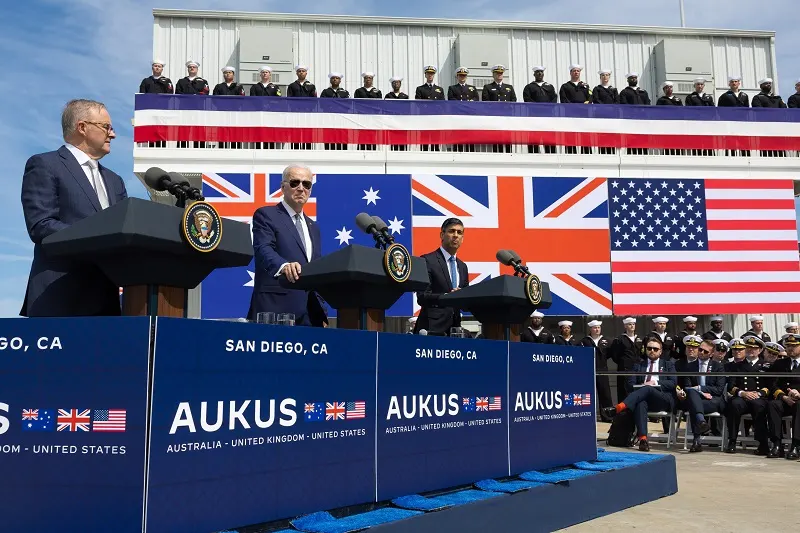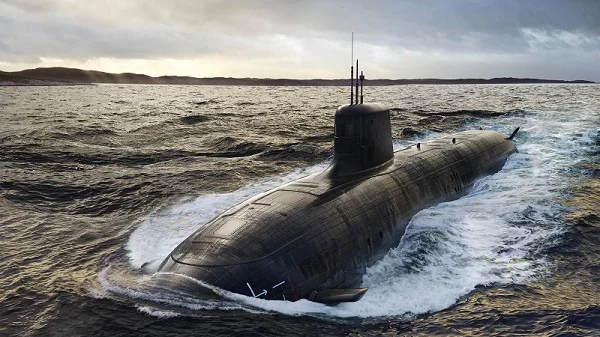China on Tuesday termed the plan to deliver conventionally-armed, nuclear-powered submarines to Australia “a blatant act” that constitutes serious nuclear proliferation risks, fuels arms races, and “hurts” peace and stability in the region.
Earlier today in San Diego, US President Joe Biden, Australian PM Anthony Albanese and Prime Minister Rishi Sunak of the United Kingdom announced an arrangement for Australia to acquire a conventionally-armed, nuclear-powered submarine (SSN) capability through the Australia-United Kingdom-United States (AUKUS) enhanced security partnership.
The AUKUS pathway will see Australia become one of only seven countries that operate nuclear-powered submarines in the world.

It is the first major initiative of the security partnership that was launched in September 2021 to promote a free and open Indo-Pacific that is secure and stable.
Together, it will deliver SSN-AUKUS – a trilaterally-developed submarine based on the United Kingdom’s next-generation design that incorporates technology from all three nations.
As per the plan, the United Kingdom will deliver its first SSN-AUKUS to replace the current Astute-Class vessels of the Royal Navy in the late 2030s while Australia will deliver the first SSN-AUKUS built in Australia to the Royal Australian Navy in the early 2040s.
Prime Minister Anthony Albanese hailed AUKUS as “the biggest single investment in Australia’s defence capability in all of our history.”
Here’s how much it will cost taxpayers: https://t.co/b6gsAG0kvG pic.twitter.com/Qlq45oFclo— SBS News (@SBSNews) March 14, 2023
“The Royal Navy will operate the same submarines as the Australian Navy. We will both share components and parts with the US Navy. Our submarine crews will train together, patrol together, and maintain their boats together. They will communicate using the same terminology and the same equipment,” said UK PM Sunak.
He also said that decisions about how many submarines UK requires will be made in the coming years, based on the strategic threat picture at the time. The UK’s SSN-AUKUS submarines will be built by BAE Systems and Rolls-Royce.
The US plans to increase SSN port visits to Australia beginning in 2023, with Australian sailors joining US crews for training and development while the United Kingdom will increase visits to Australia beginning in 2026.
“The plan we announce today delivers on this commitment and reflects our longstanding leadership in, and respect for, the global nuclear non-proliferation regime. We continue to consult with the International Atomic Energy Agency to develop a non-proliferation approach that sets the strongest precedent for the acquisition of a nuclear-powered submarine capability,” stated the Joint Statment.
Washington also announced that beginning early 2030s, it intends to sell Australia three Virginia class submarines, with the potential to sell up to two more if needed.
Presence and partnerships deter aggression. The @USNavy is confident AUKUS will strengthen the security and defense capabilities of all three countries involved and increase stability in the Indo-Pacific region. @FirstSeaLord @CN_Australia @Australian_Navy @RoyalNavy pic.twitter.com/Ycnie5rOHo
— USNavyCNO (@USNavyCNO) March 14, 2023
As Biden, Albanese, and Sunak amplified that the future attack submarines will enhance the ability of the three nations to deter aggression and contribute to stability in the Indo-Pacific and globally, Beijing shot back at AUKUS.
“The irony of AUKUS is that two nuclear weapons states who claim to uphold the highest nuclear non-proliferation standard are transferring tons of weapons-grade enriched uranium to a non-nuclear-weapon state, clearly violating the object and purpose of the NPT,” tweeted China’s Permanent Mission to the United Nations.
The irony of #AUKUS is that two nuclear weapons states who claim to uphold the highest nuclear non-proliferation standard are transferring tons of weapons-grade enriched uranium to a non-nuclear-weapon state, clearly violating the object and purpose of the NPT.
— Chinese Mission to UN (@Chinamission2un) March 13, 2023
“Such a textbook case of double standard will damage the authority and effectiveness of the international non-proliferation system. We urge the trio to honor their obligations as members of the NPT and respond to the international community,” it added.
Also Read: Australia says India at the heart of its approach to Indo-Pacific and beyond




















